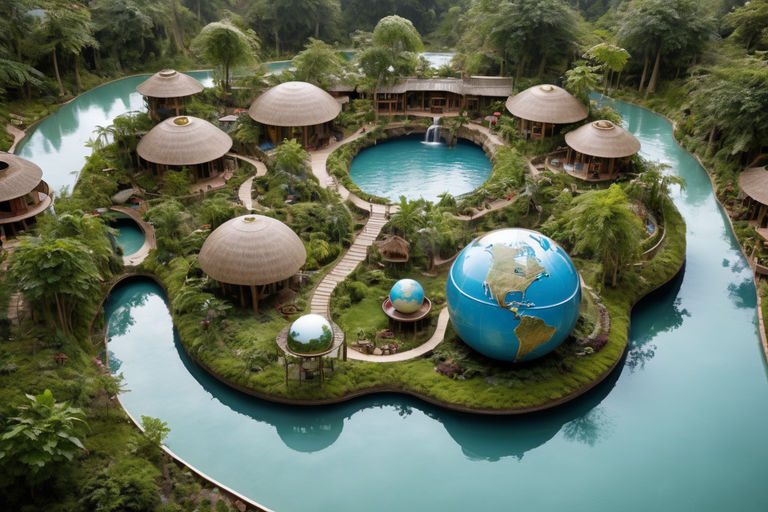Discover how ecovillages are revolutionizing environmental education, promoting sustainable living practices, and paving the way toward a greener future.
Topics
- What are Ecovillages?
- How Ecovillages Promote Environmental Education
- Lessons Learned from Ecovillages
- Implementing Ecovillage Principles in Education
- Living Laboratories for Environmental Education and Collaborative Brilliance
- Final Thoughts
Are you seeking inspiration to live a more sustainable lifestyle while deepening your understanding of environmental issues? Look no further than ecovillages. These intentional communities are not only about sustainable living but also serve as powerful models for environmental education. Let’s explore the world of ecovillages and discover how they are transforming the way we think about sustainability and environmental stewardship.
Ecovillages serve as vibrant microcosms where sustainable living is not just a concept but a daily practice. By incorporating permaculture principles, renewable energy systems, and biodiversity preservation into their frameworks, these intentional communities thrive in ways that traditional educational systems often overlook. Residents of ecovillages engage in hands-on learning that fosters a deep connection to nature and demonstrates practical solutions for ecological stewardship. This immersive experience cements the understanding that environmental responsibility isn’tmerely an academic exercise; it’s a way of life.
Moreover, the communal aspect of ecovillages allows for collaborative education that empowers members to share skills and knowledge organically. Workshops on organic farming or zero-waste living are not passive lessons but interactive experiences where participants can experiment and innovate together. This cooperative spirit inspires transformative thinking—encouraging not only individual growth but also a collective commitment to sustainability that radiates beyond their borders. Through storytelling sessions under starlit skies or gardening days with children, ecovillagers cultivate both environmental awareness and community bonds, igniting a powerful ripple effect throughout society.
What are Ecovillages?
Ecovillages are communities that prioritize sustainable living practices, environmental awareness, and holistic well-being. They are designed to minimize ecological impact while fostering a deep connection to nature and promoting a sense of community among residents. Ecovillages are often built on principles of permaculture, renewable energy, and eco-friendly building techniques.
One such example is the Findhorn Ecovillage in Scotland, known for its innovative approach to sustainable living and spiritual growth. Findhorn embodies the core values of interconnectedness, sustainability, and cooperation, inspiring visitors worldwide to reevaluate their relationship with the environment.

How Ecovillages Promote Environmental Education
One of the most compelling aspects of ecovillages is their commitment to hands-on learning experiences. Residents and visitors can participate in a wide range of activities promoting environmental education, such as organic gardening, renewable energy projects, and eco-friendly building practices. Individuals gain practical skills and a deeper appreciation for sustainable living by engaging in these activities.
In addition to hands-on experiences, ecovillages also offer a variety of educational programs and workshops focused on environmental issues and solutions. These programs cover climate change, biodiversity conservation, and sustainable agriculture, providing participants with valuable knowledge and resources to create positive change in their communities.
Furthermore, ecovillages serve as living examples of what is possible when we prioritize sustainability in our daily lives. By demonstrating the benefits of eco-friendly practices and community-centered living, ecovillages inspire others to adopt similar principles and contribute to a more sustainable future.
Lessons Learned from Ecovillages
One key lesson that ecovillages teach is the importance of sustainable living practices. From organic farming to composting to rainwater harvesting, residents of ecovillages learn how to minimize waste, conserve resources, and live in harmony with the natural world. These practices benefit the environment and promote a healthier and more sustainable lifestyle.
Moreover, ecovillages emphasize the importance of connecting with nature on a deeper level. By immersing themselves in the natural world and participating in eco-friendly activities, residents develop a profound appreciation for the environment and a strong sense of stewardship towards the planet. This connection to nature is essential for cultivating a sense of responsibility and care for the Earth.
Another valuable lesson that ecovillages teach is the power of community building. By fostering solid relationships based on mutual respect and shared values, ecovillages create a supportive and inclusive environment where individuals can learn, grow, and thrive. This sense of community is a powerful force for positive change and is the foundation for sustainable living.
Implementing Ecovillage Principles in Education
As we grapple with pressing environmental challenges, it is crucial to integrate ecovillage concepts into education to inspire the next generation of environmental leaders. Schools and educational institutions can play a key role in promoting sustainability by incorporating ecovillage principles into their curricula.
One effective way to do this is using ecovillages as case studies for lessons on sustainability, climate change, and environmental ethics. By studying the practices and principles of ecovillages, students can gain a deeper understanding of the importance of living in harmony with the environment and the impact of human activities on the planet.
Additionally, schools can organize field trips to ecovillages to give students a firsthand experience of sustainable living practices. These field trips allow students to see sustainability in action and learn from real-life examples of eco-friendly living.
Furthermore, schools can collaborate with ecovillages to develop educational programs, workshops, and internships for students interested in environmental education. By partnering with ecovillages, schools can provide students withvaluable opportunities to learn about sustainability, conservation, and community building.

Ecovillages: Living Laboratories for Environmental Education and Collaborative Brilliance
Ecovillages are exceptional models for teaching environmental education and fostering collaboration. These intentional communities embody sustainability principles in daily life, providing a living laboratory for learning and growth.
Ecovillages as Living Classrooms for Environmental Education
- Experiential Learning: Ecovillages offer hands-on experience in sustainable living practices. Residents can learn about permaculture, renewable energy, organic farming, waste management, and eco-construction by directly participating in these activities.
- Holistic Approach: Environmental education in ecovillages extends beyond ecology. Residents learn about social dynamics, community building, conflict resolution, and personal development, creating a holistic understanding of sustainability.
- Inspiring Role Models: The residents themselves become role models, demonstrating that a sustainable lifestyle is attainable and enjoyable.
- Community-Based Education: Ecovillages often offer workshops, courses, and volunteer opportunities for the broader community, sharing their knowledge and inspiring others.
- Long-Term Impact: By living sustainably and educating others, ecovillages contribute to a broader shift towards a more environmentally conscious society.
Cultivating Brilliance Through Collaboration
- Diverse Skill Sets: Ecovillages attract people with a wide range of skills and expertise. This diversity creates a rich environment for learning and innovation.
- Shared Vision: A common goal of sustainability unites residents, fostering cooperation and mutual support.
- Collective Problem-Solving: Challenges are addressed collaboratively, leading to creative solutions and shared ownership of successes.
- Knowledge Sharing: Regular community meetings, workshops, and informal exchanges promote the sharing of knowledge and skills.
- Mentorship: Experienced residents can mentor newcomers, passing on their wisdom and creating a supportive learning environment.
Specific Examples of Educational and Collaborative Initiatives
- Permaculture Design Courses: Ecovillages often offer permaculture design courses, teaching students how to create sustainable ecosystems.
- Renewable Energy Workshops: Practical workshops on solar, wind, or hydro power can empower residents to become energy independent.
- Community Gardens: Shared gardening projects promote food security, healthy eating, and ecological knowledge.
- Eco-Building Workshops: Learning about sustainable construction techniques can lead to the creation of energy-efficient and environmentally friendly homes.
- Skill-Sharing Circles: Regular gatherings where residents share their talents and knowledge can foster a culture of learning and collaboration.
By combining environmental education with a strong emphasis on collaboration, ecovillages create thriving communities that are both sustainable and inspiring. They demonstrate that it is possible to live in harmony with nature while also enriching the lives of community members.
Final Thoughts
Ecovillages are more than just sustainable communities – they are powerful models for environmental education and agents of positive change. By embodying sustainability principles, community, and environmental stewardship, ecovillages inspire us to rethink our relationship with the planet and adopt more eco-friendly practices in our lives.
As we look to the future, let us draw inspiration from ecovillages and work together to create a more sustainable and resilient world for future generations. By learning from the lessons of ecovillages and implementing their principles in education, we can build a brighter and more sustainable future for all.





